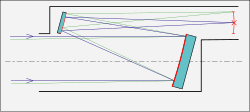Schiefspiegler: Difference between revisions
Telementor (talk | contribs) Artifacts due to diffraction |
Telementor (talk | contribs) mNo edit summary |
||
| Line 3: | Line 3: | ||
'''The Schiefspiegler''' (lit. ''oblique mirror'' in German), also called '''tilted-component telescopes (TCT)''' and '''off-axis reflecting telescopes''', are a type of [[reflecting telescope]] featuring an off-axis secondary mirror, and therefore an obstruction-free light path. This is accomplished by tilting the primary mirror so that the secondary mirror does not block incoming light.<ref>Wilson, R., & Delabre, B. (1997). Concerning the Alignment of Modern Telescopes: Theory, Practice, and Tolerances Illustrated by the ESO NTT. Publications of the Astronomical Society of the Pacific, 109(731), 53-60. </ref> [[William Herschel]] was one of the first to have tilted the mirror of his telescope in order to avoid light loss due to the low reflectivity of his speculum-metal mirror.<ref>Rutten, H., & Venrooij, M. (1999). Telescope optics: A comprehensive manual for amateur astronomers (4th print. ed., p. 117). Richmond, Va.: Willmann-Bell.</ref> |
'''The Schiefspiegler''' (lit. ''oblique mirror'' in German), also called '''tilted-component telescopes (TCT)''' and '''off-axis reflecting telescopes''', are a type of [[reflecting telescope]] featuring an off-axis secondary mirror, and therefore an obstruction-free light path. This is accomplished by tilting the primary mirror so that the secondary mirror does not block incoming light.<ref>Wilson, R., & Delabre, B. (1997). Concerning the Alignment of Modern Telescopes: Theory, Practice, and Tolerances Illustrated by the ESO NTT. Publications of the Astronomical Society of the Pacific, 109(731), 53-60. </ref> [[William Herschel]] was one of the first to have tilted the mirror of his telescope in order to avoid light loss due to the low reflectivity of his speculum-metal mirror.<ref>Rutten, H., & Venrooij, M. (1999). Telescope optics: A comprehensive manual for amateur astronomers (4th print. ed., p. 117). Richmond, Va.: Willmann-Bell.</ref> |
||
The obstructions in telescope tubes, such as secondary mirrors and their mechanical supports, cut off the intensity of captured light and cause diffraction. The diffraction causes artifacts such as the radial spikes that project from images of bright stars, and it also reduces the contrast of fine details.<ref>Ingalls, A. (1954). THE AMATEUR SCIENTIST. Scientific American, 190(2), 100-107.</ref>{{rp|102}} Schiefspieglers |
The obstructions in telescope tubes, such as secondary mirrors and their mechanical supports, cut off the intensity of captured light and cause diffraction. The diffraction causes artifacts such as the radial spikes that project from images of bright stars, and it also reduces the contrast of fine details.<ref>Ingalls, A. (1954). THE AMATEUR SCIENTIST. Scientific American, 190(2), 100-107.</ref>{{rp|102}} Schiefspieglers offer a significant increase in contrast, which is useful, for instance, for lunar and planetary study.<ref>Texereau, J. (1957). How to make a telescope (p. 400). New York: Interscience.</ref> |
||
Tilting the mirrors causes severe [[Coma (optics)|coma]] and [[Astigmatism (optical systems)|astigmatism]], however as [[Anton Kutter]] showed in the 1950s, by a suitable choice of radii these aberrations can be corrected to an acceptable level. |
Tilting the mirrors causes severe [[Coma (optics)|coma]] and [[Astigmatism (optical systems)|astigmatism]], however as [[Anton Kutter]] showed in the 1950s, by a suitable choice of radii these aberrations can be corrected to an acceptable level. |
||
Revision as of 07:26, 7 October 2019

The Schiefspiegler (lit. oblique mirror in German), also called tilted-component telescopes (TCT) and off-axis reflecting telescopes, are a type of reflecting telescope featuring an off-axis secondary mirror, and therefore an obstruction-free light path. This is accomplished by tilting the primary mirror so that the secondary mirror does not block incoming light.[1] William Herschel was one of the first to have tilted the mirror of his telescope in order to avoid light loss due to the low reflectivity of his speculum-metal mirror.[2]
The obstructions in telescope tubes, such as secondary mirrors and their mechanical supports, cut off the intensity of captured light and cause diffraction. The diffraction causes artifacts such as the radial spikes that project from images of bright stars, and it also reduces the contrast of fine details.[3]: 102 Schiefspieglers offer a significant increase in contrast, which is useful, for instance, for lunar and planetary study.[4]
Tilting the mirrors causes severe coma and astigmatism, however as Anton Kutter showed in the 1950s, by a suitable choice of radii these aberrations can be corrected to an acceptable level.
The 1.6-meter New Solar Telescope at the Big Bear Solar Observatory, and the future 4-meter Daniel K. Inouye Solar Telescope feature off-axis designs for sensitive observations of the Sun.
References
- ^ Wilson, R., & Delabre, B. (1997). Concerning the Alignment of Modern Telescopes: Theory, Practice, and Tolerances Illustrated by the ESO NTT. Publications of the Astronomical Society of the Pacific, 109(731), 53-60.
- ^ Rutten, H., & Venrooij, M. (1999). Telescope optics: A comprehensive manual for amateur astronomers (4th print. ed., p. 117). Richmond, Va.: Willmann-Bell.
- ^ Ingalls, A. (1954). THE AMATEUR SCIENTIST. Scientific American, 190(2), 100-107.
- ^ Texereau, J. (1957). How to make a telescope (p. 400). New York: Interscience.
External links
- Schiefspiegler Telescopes (SEDS)
